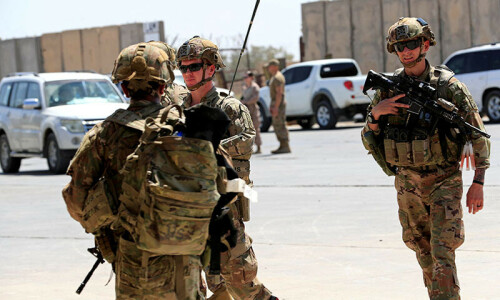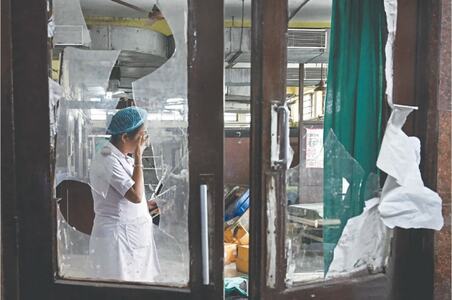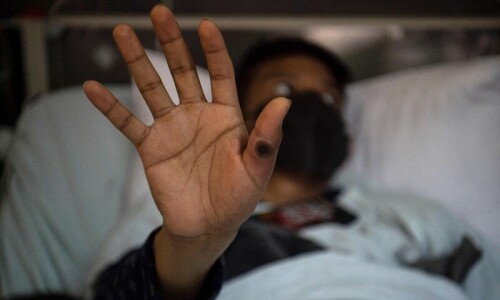MY HUSBAND and I met Ghazi Salahuddin, a senior journalist, a few weeks before moving to Istanbul. He was kind enough to gift us something personal: a diary given to him many decades ago by Muhammad Ali Siddiqi, another veteran journalist who currently serves as Dawn’s external ombudsman.
The diary had many hand-made entries by Mr Siddiqi on the basics of the Turkish language. I say handmade, not handwritten, because what he had done was type each entry on a typewriter, cut it into a size that fit the small pages of the diary and pasted them there. Mr Siddiqi had painstakingly crafted the diary, which served as both a travel guide and a language tutorial, for Mr Salahuddin before the latter was due to travel to Turkiye (then still called Turkey).
Mr Siddiqi’s handbook identified the English and Urdu words that are commonly used in daily life, and also mentioned their Turkish variants and their phonetic pronunciations, as well.
He also gave useful information about where to stay, how to address people, how to deal with hotel owners and how to handle taxi drivers. This information is still useful despite the passage of many decades, and all modern-day travel guides provide the same instructions.
So when I landed in Istanbul, I was ar-med with the knowledge that Turkish and Urdu have many similarities. But I was not prepared for how deep the similarities run. Reading the names of shops and the signboards on the streets of Istanbul now became my favourite activity.
For instance, one of the first shops that my husband took me to sold almost everything a household needs: crockery, cutlery, utensils and home linen at reasonable prices. The name of the store is Cazip, its pronunciation being almost similar to the Urdu word jazib (and it means the same). The letters C and P in the Turkish alphabet have the sounds of J and B, respectively.
The owners soon realised that I might be an ‘Ecnebi’— one of the terms used for a foreigner or, as we say in Urdu, Ajnabi — but not a tourist, and started pointing to the stuff I needed.
The shop which sells curtains in my neighbourhood is Kotil ‘Perde’. There’s a meşhur pastry shop and also a ‘Tarihi meşhur’ pastry cafe, Tarihi being a variant of Tareekhi (historic or old) in Urdu.
If I need to get some clothes stitched, I would go to the ‘Terzi’ who has his shop next to Gaziantep Pazari — pazari meaning bazaar. For vegetables and fruit, my favourite shop is one that has ‘Meyve’ and ‘Sebze’ in its name. There’s also a Fotograf Dukkani — I don’t need to explain what kind of dukaan it is.
‘Unromantic’ body parts
My go-to meat shop in my Mahallesi (Turkish variant for Mohalla) is Temiz Kasap. The word Temiz may be a bit misleading here and has nothing to do with manners or decency. Instead, it means ‘clean’. And we know who or what a Kasab is.
By now, I’ve learned how to buy different kinds of red meat, but the easiest is Kiyma! Buying chicken, though, was a bit tricky initially. I wanted the whole chicken except the heart and the liver. In the absence of a translation app, I relied on gestures. After I had gesticulated for some time, the chicken guy said, equally animatedly, “No Kalp and Ciger?’
I had never imagined till that point that I’d hear highly poetic Urdu words like Qalb (heart) and Jigar (liver) used for the rather unpoetic parts of a chicken in a chicken shop.
Speaking of poetic terms for pretty mundane things, it made the ever-so-romantic in me quite emotional to learn that red chilli is ‘kirmizi’ biber — Qirmizi is used for ‘red’ in Urdu. Black tea is ‘Siyah Cay’ — çay pronounced as chai.
Since we are on the topic of meat, an oft-seen word on posters and banners around the city in the build-up to Eidul Azha was ‘Kurban Hisse’ — an oft-used term in Pakistan, but with a slightly different pronunciation.
It would be remiss of me if I talk about words that seem familiar but have a different pronunciation, and don’t mention this one. There’s an Ottoman-era palace close to where I live that has been turned into a hotel now. It’s called Çiragan. The Turks pronounce it as ‘chiran’.
The first time I heard it (in a mechanical, bus-announcement voice) I mistook it for an Urdu word. My curiosity eventually led me to the discovery that Çiragan is actually a variation of the word Chiraghaan, which loosely translates into a “festival of lights” in Urdu.
Talking of festivals, a big one took place in my district a month or so ago. Its name — rengarenk — as mentioned on the posters reminded me of Ragnarok, a movie in the Thor series. But it was not long before I realised what it was: rangarang, as we would have called it in Urdu.
Published in Dawn, July 10th, 2024

















































Dear visitor, the comments section is undergoing an overhaul and will return soon.